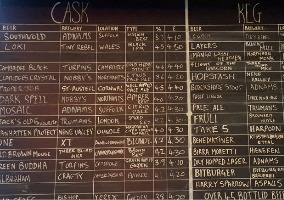
There are lots of reasons why you might consider putting on an extra beer in your pub. After all, it makes sense to give your customers choice. Not everyone likes a straw coloured, citrussy beer. It would be nice to make that customer who keeps asking for a dark beer or plum porter happy. Plus, you’ve just looked at the pictures of award winning pubs and noticed one thing they have in common is a row of pumps serving lots of different beers. So to become more popular, all you need to do is put on more beers? More beers means more choice and variety which can only be a good thing?
Well, not quite. A range of different beers and styles might appeal to the customer, but they can come at a cost. If your turnover cannot keep up with the choice, you will end up throwing away lots of spoilt beer. There is also the very real danger that customers may come across one of those slow selling beers and end up with a pint of vinegar.
The best pubs grow their beer range very gradually. I can think of an award winning pub that when it first opened sold just a single cask beer. But what a wonderful, well-kept beer it was. A month or two later, a second line was fitted and the pub steadily built a reputation for the quality of its beer choice and equally importantly how well it was looked after. Footfall has increased. That was ten years ago and now the pub serves six cask beers, runs popular beer festivals and has won numerous awards. The time scale is important. Very few pubs can become a beer mecca overnight or even in a month or two. It is much easier to lose your reputation and customers by selling poorly kept beer and then it will take a long time to re-build your reputation.
The numbers game is especially important when it comes to cask and its three day shelf life. Air, or more correctly oxygen, is the enemy of beer and once it gets into the cask, the ale will start to deteriorate. Getting the cask size right is vital, smaller sizes mean faster turnaround but not many breweries will be interested in selling pins (4.5 gallons) and not many pubs bother with them. A race spile ventilator is a non return valve that is easy to fit and will give you an extra day or two of life. For longer life (and considerably more cost) you could fit an aspirator (cask breather) that stops oxygen getting into the cask. There is, however, another way of looking at the problem that offers an alternative ‘solution’ which I will talk about another time. A solution that offers an alternative to cask.
| Brett says, “Build your beer range gradually and don’t be tempted to put on too many beers. Quality is the most important thing and with cask, aim to sell it within three days. Consider smaller cask sizes, race spiles and aspirators. One or two beers in good condition is always going be better than four or more beers that have past their best. Get a reputation for serving beer in perfect condition.” |
